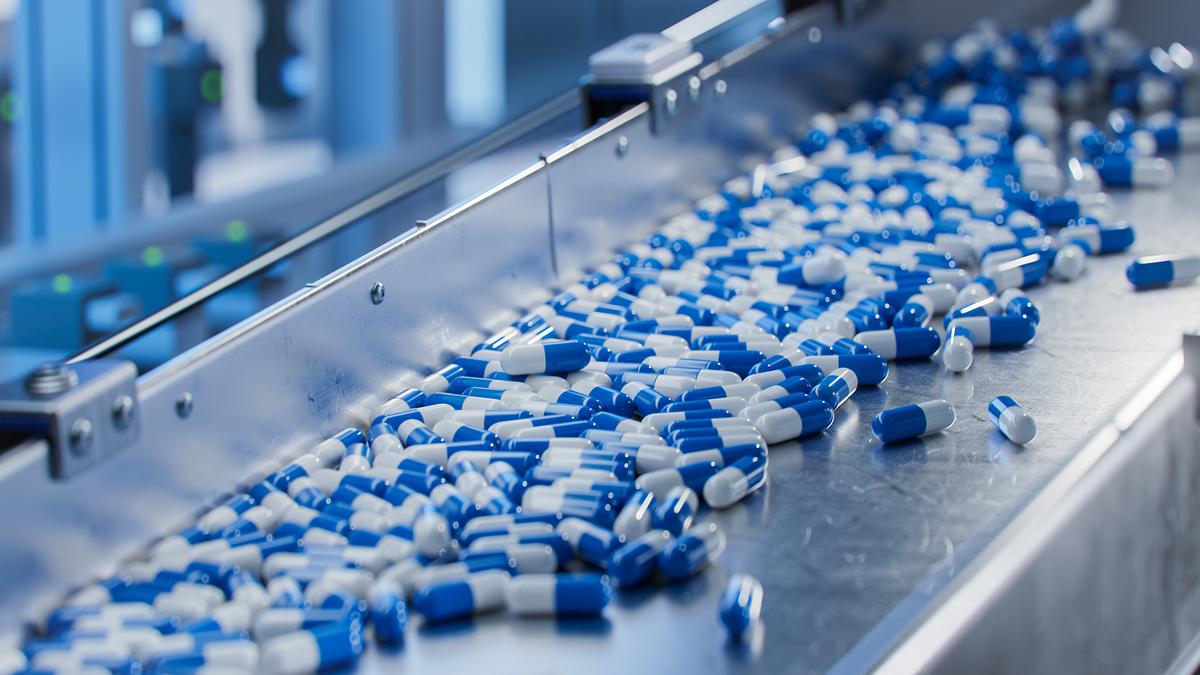AI and Biomanufacturing in India

- 17 Jun 2025
In News:
The integration of Artificial Intelligence into India's biomanufacturing sector is gaining momentum with the launch of the BioE3 Policy and the IndiaAI Mission.
What is Biomanufacturing?
- Biomanufacturing involves the use of living cells, enzymes, or biological systems to produce commercial goods such as vaccines, biologics, biofuels, specialty chemicals, biodegradable plastics, and advanced materials.
- The convergence of synthetic biology, industrial biotechnology, and artificial intelligence (AI) has expanded its scope across sectors like healthcare, agriculture, energy, and materials science.
- India, often called the “Pharmacy of the World”, produces over 60% of global vaccines, underlining its industrial strength in biomanufacturing.
Role of Artificial Intelligence in Biomanufacturing
AI is revolutionizing biomanufacturing by making it predictive, efficient, and scalable:
- AI-Powered Process Optimization: Machine learning tools adjust variables like temperature, pH, and nutrient supply in real time to enhance fermentation and reduce batch failure.
- Digital Twins: Virtual replicas of biomanufacturing plants allow engineers to simulate operations, test changes, and foresee potential disruptions without real-world risks.
- Accelerated Drug Discovery: AI expedites molecular modeling and screening of drug candidates, reducing time and cost of development.
- Predictive Maintenance: AI forecasts machinery failures, improving equipment reliability and reducing downtime.
- Smart Supply Chains: AI-driven logistics optimize cold-chain storage and forecast medicine demand, ensuring timely distribution.
Indian Examples and Industrial Applications
- Biocon uses AI to enhance drug screening and fermentation quality.
- Strand Life Sciences applies machine learning in genomics for faster diagnostics.
- Wipro and TCS are developing AI platforms for clinical trials, molecule screening, and treatment prediction.
- AI is also being explored in rural healthcare, using region-specific data for localized diagnostics and advisories.
Key Government Initiatives
- BioE3 Policy (2024):
- Envisions Bio-AI hubs, biofoundries, and next-gen biomanufacturing infrastructure.
- Supports startups with funding and incentives.
- IndiaAI Mission:
- Promotes ethical, explainable AI in sectors like health and biotech.
- Supports bias reduction, machine unlearning, and transparency in AI models.
- Biomanufacturing Mission (2023): Aims to promote R&D and domestic production in bio-based sectors.
- PLI Scheme for Biotech: Incentivizes local production of enzymes, fermentation inputs, and biologics.
- Digital Personal Data Protection Act (2023): Lays down principles for lawful data processing, though not tailored for AI-biotech intersection yet.
Challenges in Policy and Regulation
Regulatory Gaps:
- India’s existing drug and biotech laws were designed before the AI era.
- No clear mechanism exists to audit, certify, or govern AI-operated bioreactors or predictive drug systems.
Data and Model Risks:
- AI systems trained on urban datasets may fail in rural or semi-urban manufacturing due to variable water quality, temperature, or power conditions.
- Lack of norms on dataset diversity and model validation raises risk of system failure and reputational damage.
- Intellectual Property Issues: Traditional IP laws do not clarify ownership of AI-generated inventions, molecules, or production protocols.
Workforce and Infrastructure:
- Biomanufacturing needs a workforce skilled in both computational biology and automation.
- India’s AI-bio talent gap and limited high-tech infrastructure outside metro cities hinders inclusive growth.
Ethical & Safety Concerns:
- Without context-specific oversight, AI errors can threaten public safety and product integrity.
- Trust in AI systems requires clear guidelines on explainability, accountability, and redress mechanisms.
Global Best Practices
- EU’s AI Act (2024): Classifies AI applications based on risk levels. High-risk applications (e.g., genetic editing) are subject to strict audits.
- US FDA Guidance (2025):
- Introduces seven-step credibility frameworks for AI in healthcare.
- Predetermined Change Control Plans (PCCPs) allow iterative AI updates while ensuring safety.
India lacks similar risk-based, adaptive oversight.
Policy Recommendations
- Establish AI-Biomanufacturing Regulatory Framework:
- Introduce tiered regulation based on context and risk.
- Define use-cases, audit mechanisms, and model validation standards.
- Mandate Dataset Diversity & Safety Audits:
- Ensure AI tools are trained on representative, unbiased, clean data.
- Create regulatory sandboxes to test AI systems in controlled environments.
- Strengthen Public–Private Partnerships:
- Boost industry-academia collaborations.
- Incentivize private investment through R&D credits and de-risking instruments.
- Modernize IP and Licensing Laws:
- Establish clarity on ownership of AI-generated discoveries.
- Develop licensing frameworks for bio-AI algorithms and training data.
- Upskill the Workforce: Promote interdisciplinary training across life sciences, data science, and industrial robotics.
